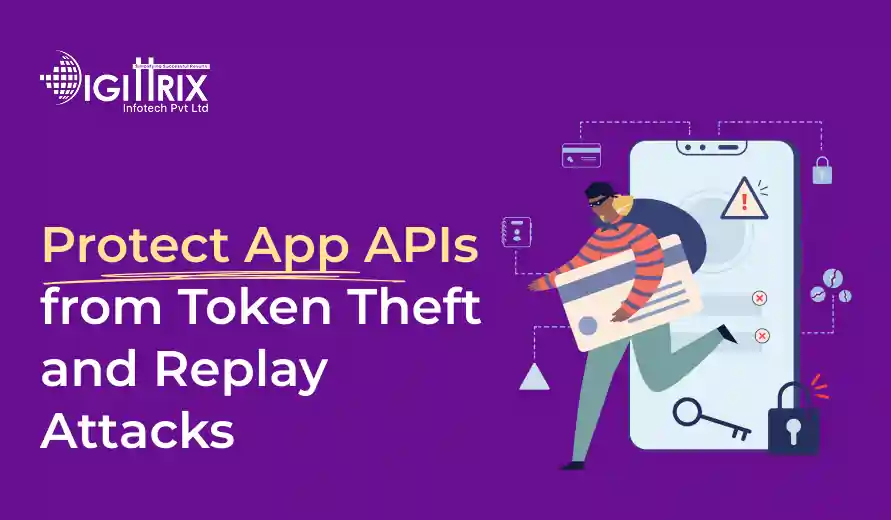Protect App APIs from Token Theft and Replay Attacks
Over 60% of mobile apps have API vulnerabilities. Token theft and replay attacks are significant risks, emphasizing the importance of secure app development practices and API protection.
Highlights
- Token theft accounts for nearly 45% of mobile app security breaches worldwide.
- Replay attacks affect 30% of apps with unsecured API endpoints each year.
- Secure token management reduces API attack risks by over 50% in app development.
An enthusiastic developer and skilled business management expert with over a decade of experience in the field

In today's digital age, mobile apps are vital to daily life. From ordering food to booking rides, people depend heavily on mobile apps to complete tasks efficiently. Behind these applications, APIs (Application Programming Interfaces) facilitate data exchange between the client and the server. Securing these APIs is crucial because they are common targets for attackers. The two main threats are token theft and replay attacks. If ignored, these threats can compromise user data, lead to financial losses, and harm a business's reputation.
Concerned about cyber fraud? Check out Digittrix’s expert strategies to safeguard your business!
This article explores practical ways to protect your app APIs from token theft and replay attacks. We also highlight how mobile app development, on-demand app development, and partnering with a custom app development company can enhance your application's security.
Understanding API Tokens and Their Importance
APIs often use tokens to verify a user's or an app's identity. Tokens are strings of data that grant access to specific resources on a server without repeatedly requesting login credentials. For example, when a user logs into an e-commerce app, the server issues a token that allows the app to request order details or make purchases without asking the user to log in each time. Since tokens provide access to sensitive information, they are attractive targets for attackers. If someone steals a token, they can impersonate the user and carry out unauthorized actions. Therefore, protecting tokens is essential to safeguard both users and the integrity of the app.
Common Threats to API Security
1. Token Theft
Token theft happens when an attacker intercepts a token during transmission or obtains it from an insecure storage location. There are multiple ways this can occur:
- Network Interception: If an API communicates over an unencrypted network (HTTP instead of HTTPS), attackers can capture tokens.
- Insecure Storage: Storing tokens in plain text within the app or local storage can allow attackers to extract them.
- Malware: Malicious software on a user’s device can steal stored tokens.
2. Replay Attacks
Replay attacks involve capturing a legitimate API request and resending it to the server to perform the same action again. For example, an attacker might intercept a transaction request and replay it to make duplicate purchases or alter data. These attacks are especially dangerous because they do not require breaking authentication; instead, they take advantage of the lack of request verification.
Steps to Protect App APIs
1. Use Secure Transmission
Always use HTTPS with TLS encryption for API communication. HTTPS encrypts data in transit, including tokens, making it harder for attackers to intercept information. Avoid transmitting sensitive data over HTTP or any unencrypted channel.
2. Implement Short-Lived Tokens
Using tokens that expire quickly reduces the risk of misuse. If a token is stolen, it becomes useless after it expires. Implement refresh tokens for user sessions to balance security and usability. Refresh tokens should also be stored securely.
3. Secure Storage on Client Devices
Tokens should never be stored as plain text within the app. Mobile platforms offer secure storage options like Keychain for iOS and EncryptedSharedPreferences for Android. These solutions encrypt data, making it more difficult for attackers to access tokens.
4. Use Token Signing and Verification
Digital signatures verify the authenticity of a token. By signing tokens with a secret key, the server can confirm that the token has not been altered. JWT (JSON Web Tokens) is widely used in mobile app development for this purpose. JWTs contain a signature that guarantees the token’s integrity and prevents forgery.
5. Implement Nonce or Timestamp Validation
To prevent replay attacks, include a unique identifier (nonce) or timestamp with each API request. The server should verify that each request is new and reject duplicates. This method guarantees that even if a request is intercepted, it cannot be reused.
6. Rate Limiting and Request Monitoring
Rate limiting controls how many API requests a client can make within a set time. Monitoring unusual patterns, such as repeated requests from the same user or IP, helps identify potential replay attacks. Acting quickly, like blocking suspicious requests, improves security.
7. Multi-Factor Authentication
Adding an extra layer of authentication makes it more difficult for attackers to misuse stolen tokens. For example, requiring OTP verification for sensitive actions ensures that just possessing a token is not enough to carry out critical operations.
8. Regular Security Audits
Perform regular security audits to find vulnerabilities in the app or API. Penetration testing reveals potential weaknesses that could be exploited for token theft or replay attacks. Updating the app with security patches decreases exposure to known threats.
Role of Mobile App Development in Security
Security should not be an afterthought during mobile app development. A dependable mobile app development team incorporates security at every phase of the process. From designing secure API endpoints to implementing token encryption and validation, developers have a vital role in safeguarding user data.
Following best practices in mobile app development guarantees that tokens are generated, transmitted, and stored securely. Security-focused development also includes adding detection mechanisms for suspicious activity, such as failed login attempts or repeated request patterns.
Protecting On-Demand Apps
On-demand apps, such as ride-hailing or food delivery services, often handle sensitive user information, including location data and payment details. Protecting API tokens in these apps is especially crucial because attackers can exploit stolen tokens for financial gain or invade privacy.
By combining short-lived tokens, secure storage, HTTPS communication, and replay prevention techniques, on-demand app development can establish a safe environment for users. Additionally, monitoring API traffic in real-time allows for quick detection and mitigation of potential attacks.
Partnering with the Right Development Partner
Working with a custom app development company offers an added layer of confidence. Experienced firms have dedicated security teams that follow industry standards to prevent token theft and replay attacks. They conduct thorough testing, implement encryption techniques, and design APIs with built-in security features.
A custom app development company can also offer ongoing support by updating security protocols as new threats appear. This proactive strategy keeps the app protected throughout its entire lifecycle.
Best Practices for Developers
- Avoid Storing Secrets in the Code: Never hardcode tokens, keys, or passwords in your app’s source code. Use environment variables or secure storage.
- Use HTTPS Everywhere: Make sure all API requests, including token exchange and data submission, use HTTPS.
- Validate Input on Server: Always verify incoming data on the server side to prevent injection attacks that could expose tokens.
- Log and Monitor Suspicious Activity: Keep logs of API requests and watch for anomalies. Detecting unusual patterns early can prevent serious breaches.
- Educate Users: Encourage users to update apps regularly and avoid jailbreaking or rooting their devices, as these actions compromise security.
Token Management Strategies
- Use JWTs with Expiry: JWTs with expiration times help prevent long-term token misuse.
- Implement Refresh Tokens Carefully: Store refresh tokens securely and rotate them regularly.
- Revoke Tokens Immediately: If suspicious activity is detected, revoke tokens to block further access.
Handling Replay Attacks
- Nonces and Timestamps: Each request must include a unique value to avoid duplication.
- HMAC Signatures: Using a hash-based message authentication code guarantees that the request remains unaltered and is unique.
- Session Management: Associate API tokens with a particular session and device. Requests from unfamiliar devices should prompt re-authentication.
Testing and Continuous Improvement
Security isn't a one-time effort. Mobile and on-demand app development teams should regularly test APIs for vulnerabilities. Automated tools can simulate attacks, helping developers find weaknesses. Continuous improvement guarantees that security protocols adapt to new threats.
A custom app development company usually offers structured testing and support. They adopt a proactive security approach by updating APIs and authentication methods to stay ahead of attackers.
Looking to enhance your ERP/CRM system? Check out Digittrix’s expert insights on integrating WhatsApp API to boost customer engagement and streamline communication!
Final Words
Protecting app APIs from token theft and replay attacks is essential in today’s mobile-driven world. Developers and businesses need to prioritize security at every stage, from mobile app creation to on-demand app solutions.
Key measures include using HTTPS, implementing short-lived tokens, secure storage, token signing, nonce or timestamp validation, rate limiting, multi-factor authentication, and regular security audits. Partnering with a custom app development company can enhance security through specialized expertise and ongoing monitoring.
Following these practices helps businesses protect sensitive user data, maintain trust, and lower the risk of financial and reputational harm. App security should be a continuous effort, not a one-time task, to keep APIs safe as threats evolve.
Build an App with Secure APIs with Digittrix
In today’s digital landscape, protecting your app’s APIs from token theft and replay attacks is crucial for safeguarding user data and maintaining trust. A secure app ensures sensitive information, such as user credentials and transaction details, remains safe while providing a smooth and reliable user experience. Key features like encrypted data transfer, token validation, secure storage, and request verification are vital for preventing unauthorized access and repeated malicious requests.
As a trusted custom app development company with over 14 years of experience, Digittrix delivers solutions with secure architecture, user-focused design, and advanced security measures. Our expertise in mobile app development and on-demand app development enables businesses to effectively protect APIs and create a safe environment for users.
If you’re planning to develop a mobile app with strong API security and need expert guidance, contact our team today. Call +91 8727000867 or email digittrix@gmail.com to schedule a consultation and start building your secure app.

Concerned about data breaches? Check Digittrix's Immigration CRM insights to protect your business!
Do you need help in Web Development ?




Join over 1500+ businesses we've already helped!
 +91-8727000867
+91-8727000867
 +64 22 003 5555
+64 22 003 5555





 Request Instant Call
Request Instant Call Hire Remotely
Hire Remotely
